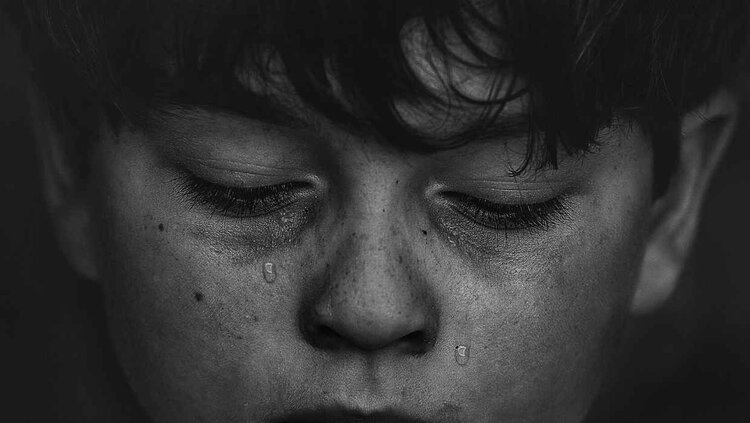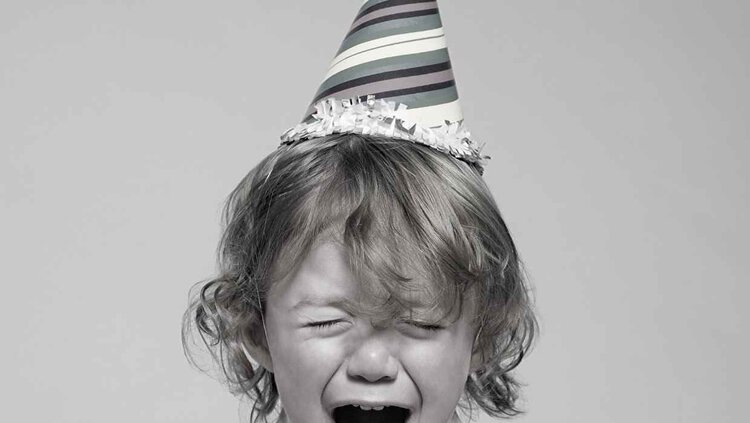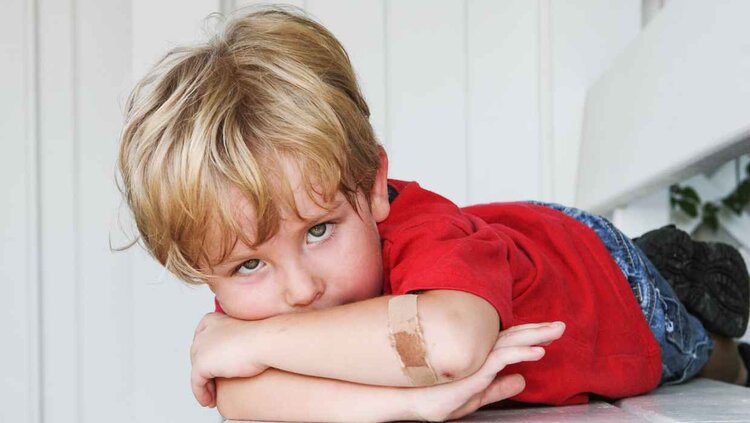After all, you’re the one who knows them best, and are around them the most.

Getty image
Anxiety and worry in children translates differently than it does in adults, which is why it's important for parents to recognize the signs, and at what age these fears transpire.
While adults have proper coping skills they've learned throughout their life to properly handle their anxiety (and even then adults sometimes can't), children only know that something is amiss and needs to be done about it.
That moment is a terrifying and authentic experience for them. So when adults dismiss it as something that they need to get over, they are missing vital opportunities to show their children what to do with their anxiety, and why they might be experiencing it.
Check out Emotionally Healthy Children Have Parents Who Refuse to let Them do These 8 Things to gain more understanding about your child's emotional needs.

Getty image
Most of the time, parents aren't aware that their kids are emotionally reaching out. So while it may look like your toddler is having a tantrum, it's their way of expressing a genuine fear about something. Sometimes, they are merely throwing a fit.
From infancy to adolescence, our kids will go through a range of outward expressions of inner emotions. It's our job as their parents to help them identify their feelings and navigate through them. Beautiful things happen when we can walk alongside our children as a non-judgemental and safe place they feel.
It's with patience and understanding we can better meet them where they're at, instead of continually expecting them to perform the way we think they should. When we can do this, our livelihood as individuals will also improve, as we benefit from our child leaning on us for understanding and encouragement, and not fighting us on everything.
As every child is different and every circumstance unique, parents can take control of their families and improve their relationship with their kids at any age. It only takes intentionality, and the willingness to accept that you aren't perfect, and most importantly, that neither are your kids.
Here is a helpful list to help you better understand what worries your child has at a particular age.

Getty image
Anxiety in kids - When, why, and how parents can help
Infancy to Toddlerhood
A baby cries because it needs food, sleep, a diaper change, etc. But did you also know it has NO idea that when you leave a room, you'll be returning? So for them, the knowledge of the safest thing they know being removed from their smell and sight vicinity is terrifying.
Swaddling babies isn't just something we do to keep babies from scratching themselves, but it's also to make them feel like they are still in the safety of their mother's womb.
As parents, it then becomes our job to understand what soothes our baby, and we do our best to attend to their needs and make them feel as safe and happy as possible.
When babies turn into toddlers, their fears and worries shift as they begin to understand things differently. They start to realize that their voice becomes heard.
Depending on the child, this can be the time where their fears of the unknown translate to tantrums. What most parents don’t realize is that it’s completely normal. It’s an age where they can’t quite communicate their frustrations or worries with words, and throwing a fit is one of the only responses they know.
BUT THIS IS ALSO AN AGE WHERE THEY CAN BEGIN TO LEARN RIGHT BEHAVIORS INSTEAD OF WRONG.
By explaining things before they happen, especially if it’s something they might not like, it might ease the transition for them and help them better understand a situation.
As trust continues to form between parents and child, they can begin to understand that throwing a fit won’t give them what they want, as long as you are firm in not giving them what they want, when they want it.
Again, every child is different, so there is no one fix solution for this. Tantrums shouldn’t be looked at as something that needs to be fixed. Just recognize it as something that is a part of toddlerhood, and building trust with them in this time can help.
Do your best to balance discipline with understanding that their understanding of a situation is much different than yours.

Getty image
Preschool and Kindergarten (3-5)
Preschool through Kindergarten is the age when a child begins to understand that there are scary and frightening things in this world, whether that's a monster under their bed, or their pet dying.
They begin to recognize their feelings and emotions and can somewhat understand them, but don't quite have the skills to know what to do with them. This time is crucial for parents to come alongside and explain EVERYTHING. You can never explain too much to a preschooler.
They will bombard you with questions and talk your ear off about all they are learning in the world. It's a sweet time that a child begins to relate to their parents. A little girl will begin to want to dress like her mommy, or a boy will want to be his dad when he grows up.
In this time, we have to assure them, perhaps 30 times over, that there is no monster under the bed. We have to tell them the truth, but also be careful with the details. And most importantly, we have to monitor what they see with their eyes, and hear with their ears.
Protecting your child's innocence at this age is SO crucial to the worries and fears that come and take place in their minds. If you're letting them watch movies above their maturity level, of course, they are going to have nightmares.

Getty image
6-11 Grade School to Preteen
When my son turned 6, I saw an almost immediate shift in his fears.
He went from being scared of the dark to noticing that kids are capable of rejecting him as a friend.
I'm sure a lot of this had to do with us moving to Germany at the time, but he began to worry about the fact that he was American, and the rest of the school wasn't.
He also began to understand that we as his parents aren't invincible, and there was a genuine fear that he could lose us.
At this age, a parent will begin to notice more disrespect as a child becomes more independent.
Their hormones are changing, their brains are forming, and all the while, they are taking in and realizing that this world is not so forgiving after all. It's a hard place to be that is full of worry and fear.
As your children begin to understand the world and its darkness, the best thing you can do is to be their safe space. Accept them for the awkward little preteen they become, and when they fail, have grace.
Discipline within this time will pave the way for your relationship with them as a teen. Don't let them get away with everything, but also recognize that they have to fail and make mistakes to learn.
It's okay that they aren't perfect, don't have straight A's, or aren't the captain of the basketball team. What will matter most and stand the test of time in your relationship with them is to simply be there for them.
Be the non-judgemental space they go to when things get tough. Identify WITH them, and try and remember what it's like to be that age.

Getty image
12-18 Teenagers
This is an age when a child’s juvenile fears turn into full-blown anxiety. When an adult has anxiety, they have most likely acquired certain coping skills throughout their life.
But tweens and teens aren't quite sure what to do when the pressures of adolescence comes —which it will.
Things like grades or being on a sports team might be something that a child’s parent desires them to excel in. But what they don’t realize, is that their kids desire to please them, will most times outweigh their desire to take care of their own mental well-being.
Kids will seek to please the parent, instead of learning their own boundaries, limits, and capabilities.
So along with the extreme peer pressure placed on them at school by their friends, as well as their teachers, they have an added element of pressure brought on by you, the parent.
This is where a parents positive influence can greatly outweigh the stress of teenage life that can sometimes lead to mental health issues later on in their life.
What does that mean?
It means that you should stop expecting your child to be perfect at everything. It means that grace should outweigh expectation. It means that you become their safe place—a space they feel free to be themselves in.
It also means that you are the one who can show them that it’s not their job to make everyone happy by not expecting them to make YOU happy.
Teach them to understand their limits and have boundaries—but also encourage them to not stop in the face of failure. It’s all about balance.
Another thing your tween or teen still desperately needs from you, is to simply hear why and how you are proud of them—and they need to hear it OFTEN.
Even though your child may give you blank stares or rolling eyes in response to your words of affirmation, they still need to hear from you that they are worth something. And that shouldn’t stop after they graduate.
I’m a grown-up, but I still need to hear that my parents are proud of me.

Getty image
SUMMARY:
Parents often overlook their kid’s struggle with anxiety, sometimes due to our own problems we face in life.
But the relationship between a parent and child will always include a teacher/student scenario when it comes to their wavering emotions and feelings, whether it’s a positive or negative influence—whichever direction that goes is entirely up to you.
When you can better understand your child’s feelings and why they have them, you can better prepare them for a mentally and emotionally healthy lifestyle, while bridging the emotional gap in your family.
Share...

No comments:
Post a Comment